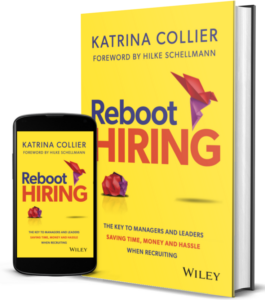What do you gain by allowing poor hiring manager behaviour?
I’m still on my global talent acquisition training adventure with Sue Ingram and we were nattering about poor hiring manager behaviour – especially towards recruiters – especially when managers misbehave.
Because that’s what it is.
Behaviour.
Behaviour that does not belong in the hiring process and impacts everyone negatively. Especially, as I wrote last time, themselves.
Behaviour that has been allowed to continue. Possibly by you. Often by others.
But why do recruiters and talent acquisition permit its continuance?
What do you gain? 😮
I’m reminded of my sessions with Michelle Zelli, when she would ask, ‘What are you gaining here?’ about a self-sabotaging negative pattern of behaviour I would be running. Or those uncovered during Dr John Demartini’s breakthrough weekend, when he asked me to find the silver lining in my childhood trauma.
It was always there – the silver lining. The reason I was allowing something that made my life worse to continue!
It is the same for any recruiter or TA pro that allows poor hiring manager behaviour to continue running patterns that don’t serve the company, the manager, the project/client, the candidates, or you.
Which poor hiring manager behaviour?
To be clear, I mean all those things your managers do – especially when they’re hiring – that make the entire process a pain in the proverbial, inefficient, frustrating, long, slow, etc., etc.
Anything that you would like to change if you could wave a magic wand… but don’t. Anything you find yourself complaining about… but don’t change. Or even talk to HR about a bad manager!
So if it’s for the greater good of the company, you know, the one paying you… why don’t you fix it?
1. Conflict avoidance
This was Sue’s shoutout. As a bolshy Australian, even one who grew up in a house of fear & trauma, I still don’t understand why people avoid conflict. But having also had a small introduction to The Culture Map (thank you, Sue) I now see why culturally certain nationalities actively avoid raising an issue – even if it’s for the greater good.
Early in my time in London, I came out of Waterloo Train Station and was looking at the number on the front of the bus – it is located on the top left, far away from the pavement. Excited it was my bus, I jumped on, and immediately this woman started huffing. This lasted across The Thames and half way around Aldwych until I eventually went, ‘what?’ She exploded, in true British passive-aggressive style, ‘Didn’t you see the queue?’ Full of righteousness, she didn’t believe that I hadn’t.
As I was boarding, an Aussie would have said, ‘Mate, there’s a queue.’ I’d have replied, ‘Oh sorry!’ and promptly gone to the end of the queue. But by avoiding speaking up in case it caused conflict she created her own. (I was still non-plussed! 😆)
Similarly, if you’re avoiding speaking to a manager about their behaviour because you don’t like conflict, you are gaining “perceived” peace but what you are doing is creating stress and avoiding what is best for the company and the poor suckers going through the hiring process.
2. Bowing To Hierarchy
I always love the looks I get when I tell TA pros that, ‘I don’t care if they’re the VP of VPs. You are their equal in this hiring process. You are managing the process, they make the final decision. You are the expert in recruitment and they are the expert in whatever it is they do.’
You cannot manage the hiring process if you bow to their hierarchy and believe that you cannot ask the tough questions or chase them for interviews, feedback etc. because they have a long and important-sounding job title or aeons of experience. They want this recruitment pain to go away!
Instead, find out what is at stake with this vacancy. What happens if they don’t find someone soon? What’s the cost to the team, project, company, client, etc.? Do they have a promotion riding on it? Is it a huge financial cost to the company? And so on.
Then use it!
‘Yes, VP of VPs, I understand – I am concerned that delays in the process are costing [personal/business cost] and that we may need to start the process all over again. Whereas 10 minutes now will save you 20 hours restarting later.’
Short, factual, calm, and talking in benefits to the HM! Sue shared with me that when giving feedback like this – yes, chasing is feedback – that it’s best to avoid the use of the word ‘you’ as it can sound accusatory. Hence I used ‘I’ and ‘we’ and only one ‘you’.
3. An Easy Life
It could just be you just want an easy life. You may simply not care that you’re continually delayed or derailed by the manager’s behaviour. You may simply prefer to roll with it than pushback and create an exceptional hiring experience.
And if you have found somewhere that permits you to keep slinging candidates at managers without measuring the (in)efficiency or cost to the company, manager and candidates, don’t change jobs but do expect to be replaced by technology at some point.
What did I miss?
I’m sure there are many more reasons that people don’t address their managers’ behaviour! If you want to address poor hiring manager behaviour, drop me a line.

